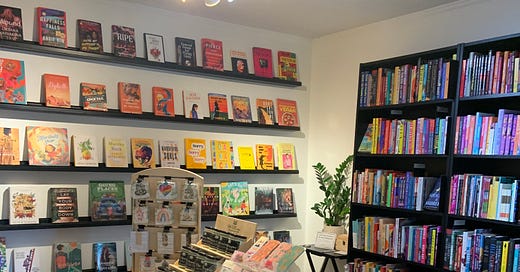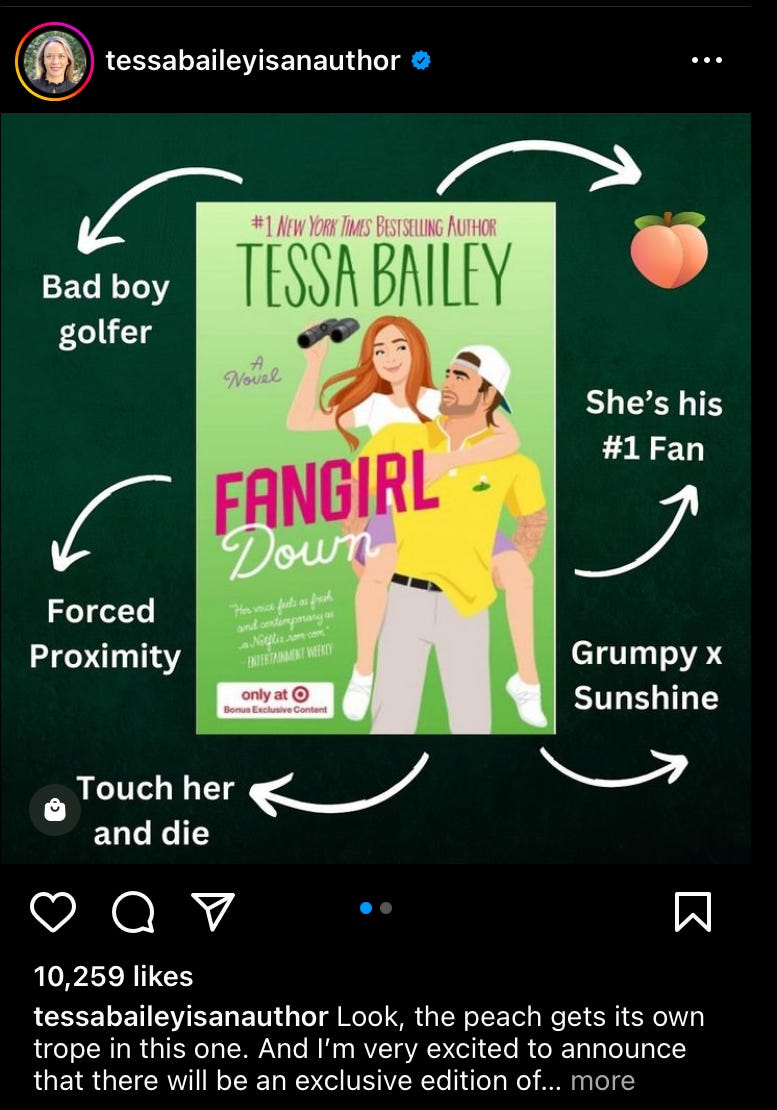Growing up, I was very connected to books and reading, whether it was my dad reading me bedtime stories or my mom taking me to the library so I could read the next Curious George adventure or them buying me the first book of the Junie B. Jones series because I had graduated to chapter books. I even went so far as to write my own book, Go Isabella Go in kindergarten (possibly inspired by Dr. Seuss’ Go Dog Go). Books were all around me and I loved the opportunity to make new friends with the characters in the pages. This love faded the further I got into my education because reading became a chore rather than a choice. I found myself barely reading the required books and struggling to get my Accelerated Reading programs done in middle school. I could no longer bring myself to be excited about books because every time I finished a new one, I had to take a quiz on it to make sure I actually read it. This only got worse in high school when I completely gave up on following required readings and instead turned to websites like SparkNotes to help me pass assignments. Entering college, I declared an English major not because I enjoyed reading, but instead because I liked to write. My anti-book and anti-required reading campaign was going strong till everything changed in September 2022. I found myself sleepless one night in my second year of college and so I turned to a book, The Silence that Binds Us, to help me through the night. I had started the book in the summer and was barely fifty pages in, yet I found myself finishing the book later that same week. My choice that night sent me down on a path to reconnect with reading that has sent me down a rabbit hole of analysis, discussion, and discovery.
With a newfound interest in reading, I decided to commit to reading and actually give it a chance separate from school. The problem was it had been years since I read books that weren’t assigned for school, so I didn’t know what books or genres would fit my tastes as a 20-year-old young adult. I doubted my tastes from when I was 10-years-old would still be appropriate (I will forever love the Geronimo Stilton series though). Because I had no direction with which books to read, I turned to social media for guidance. Apps like TikTok, Instagram, and YouTube have communities dedicated to books called BookTok, Bookstagram, and BookTube respectively and within these communities I quickly found many recommendations. That translated into a year of reading mostly books recommended from these apps- for better or for worse. My feelings have slowly changed towards these apps the more I am on them and the more embedded I get into the communities. My goal for this essay is to present some benefits to the online book communities, but also some of the negatives that have transpired.
BookTok is, without a doubt, the most popular of the three apps for finding a book community. Videos on BookTok get thousands of views and book creators get millions of likes. As an English major, I am always analyzing the books I read (it’s a reflex at this point) so I viewed social media as a way to see the different interpretations of the books I was reading. Early on in my BookTok experience, I liked how it felt like a book club shared by thousands of people because it made the experience of reading less lonely. I was excited to read the same books that everyone else was reading so I could then be in on the joke or community and the discussion surrounding it. I found myself reading books that I would have never been interested in like A Court of Thorns and Roses and Fourth Wing because I don’t like fantasy as a genre, but I wanted to see what the hype was all about. These two remain some of my favorite books to analyze and discuss with people because my interpretation and opinion of them differ so heavily from the general consensus online. I also discovered some books that have become my favorite books like Daisy Jones and the Six (DJTS) and Indigo Ridge. I connected with DJTS because BookTok loves The Seven Husbands of Evelyn Hugo (Evelyn Hugo) and both are written by the same author, Taylor Jenkins Reid, so I found myself reading DJTS after I was influenced to read Evelyn Hugo. Similarly, I found Indigo Ridge due to BookTok’s love of Juniper Hill, a later book in the same series. Obviously, I started with the first book in the series and absolutely fell in love with it and it has remained a comfort book for me that I reread when stressed out by school. Emily Henry became one of my favorite authors due to the constant conversations around her books and the curiosity around why her romance books were so swoon-worthy. I instantly connected with the female main characters and felt represented in her books (stressed out woman in a book and writing-related field or woman with no clue what to do with her life). Overall, these websites can help readers sort through a ton of books to find their specific niche and discover unknown authors.
BookTok and Bookstagram break down books into specific tropes and micro-tropes to help market the books better to each content creator’s audience and general community. Before continuing, it is worth noting that most of the books promoted on these platforms are romance books. In 2022, romance books saw a 52.4% increase in sales from 23,680 unit sales to 36,092 unit sales. Books like Colleen Hoover’s It Ends With Us, Lucy Score’s Things We Never Got Over, and Elle Kennedy’s The Deal sold thousands of copies, all of which were heavily promoted on BookTok. I myself have read Things We Never Got Over and The Deal and have read a different one of Hoover’s novels. It is worth noting that A Court of Thorns and Roses was a leading seller for fantasy, which also saw an increase from 2021 to 2022 of 17.4%. Most readers in these communities only want books that have some form of romance involved, even if it is mainly a fantasy or mystery book, they still want romance included. With that in mind, these apps break down these romance books into tropes like enemies-to-lovers, second chance, mafia, stalker (yes, this is real), accidental pregnancy, single dad/ nanny, and single mom. On BookTok, audiences can specifically search for videos that will recommend only books that include the trope that they want. I myself have been guilty of specifically searching for one specific trope on the app depending on what I am in the mood for; I am particularly fond of the marriage of convenience trope. The problem with assigning a trope to a book becomes more obvious on Bookstagram where every book is marketed only using the tropes found in the book. At least on BookTok, some creators use scenes from the book to promote and others describe the plot of books like it is gossip to hook people. BookTok’s video format allows for creators to create discussions and carry them on in the comments.
This is a screenshot of a video from BookTok where they promote the plot of the books through tropes and scenes. Keywords for those who are familiar with book tropes are: assistant, pregnant, and billionaire. Just seeing these words can hook readers into trying the book, I myself read this book due to this ad. Because so many creators from TikTok also use Instagram, many videos like the one above can be found on Bookstagram. Mainly on Bookstagram though, there are graphics for books in which they point out all the tropes and micro tropes associated with the book. For example, a post promoting the book Pretty Rings and Broken Things by Kat Singleton promoted the book by saying it included the following tropes: arranged marriage, no third act breakup, billionaire romance, rival families, “my wife,” age gap, and obsessed hero. While this method of promotion may be effective for some readers who won’t read certain books depending on the trope (I personally won’t waste my time reading a “second chance romance”), the method causes more problems than it solves.
One thing I have noticed with this method is that authors themselves will promote their books based on their tropes and will sometimes add tropes for the sake of hooking readers. Recently, Tessa Bailey promoted her new book Fangirl Down using the tropes: bad boy golfer, forced proximity, touch her and die, grumpy x sunshine, she’s his #1 fan, and the peach emoji.
This screenshot went viral on X, which has its own book community that discusses what they are reading and asks for suggestions. It is a tamer version of the other book communities and often makes fun of BookTok, for example, they made fun of this book for how ridiculous it is for there to be a “bad boy” golfer. Therein lies the problem with boiling down a book to its tropes: you can’t fully explain or understand the nuances of a character in one specific trope. The “bad boy” golfer, Wells, is that way due to everyone in his life abandoning him and a childhood marked by behavioral issues before being rescued by his golf mentor, who also goes on to abandon him. The pieces of Wells that create a complex character are automatically negated by the label because the audience no longer takes him seriously. These specific tropes promoted also point to a larger issue of the sexualization of characters and sometimes real people within the romance community as evident by the recent scandal including BookTok and the Seattle Kraken hockey team. BookTok users started to sexualize one of the players to a point where his wife asked people to stop and to leave her husband alone. The promotion of tropes puts the emphasis on the promise of sex within romance novels and drama rather than plot and character.
Over the course of my year-long reading journey, I have seen the effectiveness of tropes decrease as they become more popular. At first, they were this fun way to give a little hint about the type of romance to be teased like Better Than the Movies being promoted as childhood-friends to lovers. It teases a cute book about Wes and Liz, two high schoolers who fall in love. The reader really doesn’t need to know much else to go in and enjoy it. With the current way books are promoted, the tropes of Taylor Swift references, banter, fake dating and he falls fist would also be applied to promote the book. This is an overkill that drowns out the simplicity of the romance plot. This over-complication of the promotion and the books itself frustrate me because I do not need to know every single detail or scene that I will read. The thrill of discovering a scene is dashed because I saw an Instagram post spoiling a scene in the third-act of a book. I think (hope) this trend of tropes will start to decrease as more and more people start to criticize and call out how unnecessary and downright weird some of the tropes are. Books are made by the characters and their developments, not by the terms we use to promote.





